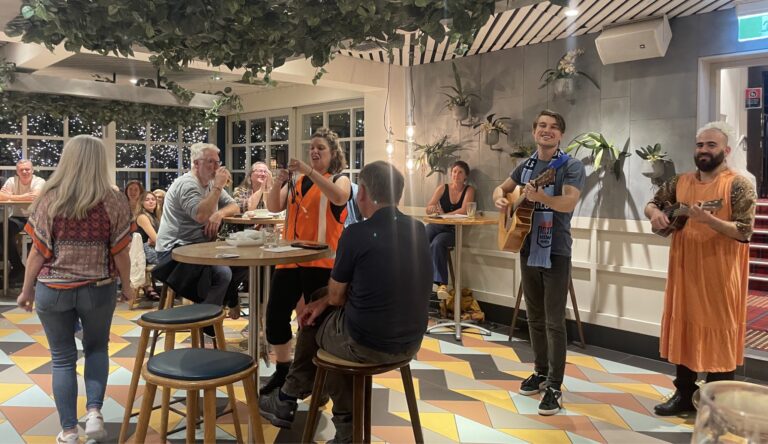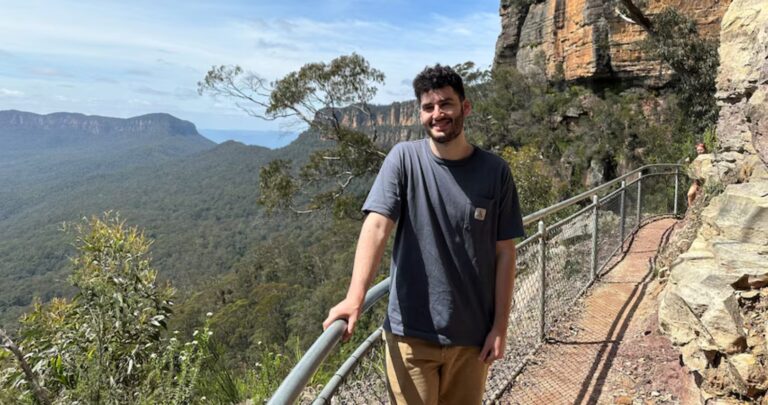
Chuck a wallaby on the BBQ

BY ALEC SMART
The summer scent of pork, beef, lamb and chicken frying on Aussie barbecues may one day be a thing of the past, replaced by healthier native delicacies, like possum, wallaby and emu, if chefs promoting indigenous cuisine influence our eating habits.
Kangaroo meat has already undergone a resurgence in the nation’s palate palette, and where it was once typically sold alongside dog food in supermarket fridges, is now found marinated and seasoned in the game section, where it retails at a premium price.
Despite it being eaten by native Australian for tens of thousands of years, kangaroo meat was only legalized for human consumption across Australia in 1993, although in South Australia it has been available since 1980.
Groups such as the Ecological Society of Australia and the Australasian Wildlife Management Society support agricultural production systems based on native animals rather than introduced livestock, like sheep and cattle.
They argue it offers considerable ecological advantages, such as reducing greenhouse gas emissions (a study found that the livestock sector – primarily cattle, pigs and chickens – produces 37% of all human-induced methane, which damages the ozone layer). It also preserves fragile rangelands (grasslands, shrub, deserts, wetlands) easily damaged by the heavy hooves of grazing livestock.
Bush food – also called bush tucker – is any fauna or flora native to Australia used for culinary and/or medicinal purposes. Examples of meats include crocodile, kangaroos, emus and witchetty grubs (reportedly peanut butter-flavoured!), while fruits, vegetables and spices include quandong, riberry, finger lime, Warrigal greens, and myrtle (which comes in lemon and aniseed flavours). Flavoursome fungi include beefsteak and native bread varieties.
Perhaps our most famous bush food, harvested by Aborigines for millennia and now a major export farmed in large-scale commercial operations, is the delicious macadamia nut.
Outback Pride are among several food producers that specialise in indigenous cuisine, creating pickles, relishes, sauces, spreads and wild herbs to enhance native bush foods while supporting traditional Aboriginal communities.
“Being able to dip into this true Aussie cuisine in an accessible and delicious way is the way to create new understanding of very ancient food,” said Gayle Quarmby of Outback Pride, which has provided restaurants with Australian native ingredients since 2001.
“The only way to hold onto this unique and ancient food culture is to commercially cultivate the plants using a sustainable, ethical and organic mandate, whilst honouring the First Nations’ stewardship of this great land and its food for thousands of years.”
Another indigenous food producer, although perhaps a source of protein that many may struggle adapting to, is the Edible Bug Shop, which specialise in roasted crickets and mealworms.
“Edible Insects are a sustainable source of protein, and are an important part of our food future,” they declare. “The way we farm our edible crickets uses less energy, less water and creates less greenhouse gases than traditional forms of protein.”
Two separate opportunities to sample indigenous, wild-gathered cuisine, are coming up in February.
*On Saturday 17 February, Shared Knowledge, together with Centennial Parklands, are hosting a Bush Foods Experience in Centennial Park.
Using a traditional coolamon – a canoe-shaped shallow dish used by Aboriginal women to carry water and native foods (as well as cradle babies!) – gather seasonal fruits, seeds, berries, native vegetables and plants from around Centennial Parklands.
Thereafter learn about traditional food preparation methods and taste your own bush food infused recipes.
*On Friday 9 February, Carriageworks contemporary multi-arts centre in the converted railway sheds in Eveleigh bring the two aforementioned native food producers (Outback Pride and Edible Bug Shop) and a range of chefs and indigenous food experts together in The Night Market.
Renowned chef Kylie Kwong, the curator of Night Market, told City Hub, “I do believe there is a growing market for indigenous ingredients as the general public learn more and more about their unique and distinctive flavours, textures, cultural significance, traditional uses.
“The food media over the past 5 years have been very encouraging in their increasing coverage of the importance and deliciousness of native Australian ingredients plus there have been several episodes on Masterchef Australia exploring native ingredients – this is only a positive!
“More and more chefs and restaurateurs are integrating native ingredients on to their menus which is fantastic to see and some native ingredients are now available from selected food stores and local farmers markets – i.e.: warrigal greens, karkalla, saltbush, samphire, Bower spinach etc.
“Yes I do find that people are willing to experiment with unusual foods and all they need, is a good, simple recipe to follow, as they begin to use these stunning ingredients.”
Speakers and cooks at the Night Market include: Josh Niland of Saint Peter fish eaterie in Paddington, talking about sea urchins; Skye Blackburn of The Edible Bug Shop, on the sustainability aspects of edible insects whilst offering delicious samples to taste; chef James Viles of Biota Dining in Bowral, who uses a lot of native ingredients in his food; and founder-manager of Ngaran Ngaran Culture Awareness, Dwayne Banon-Harrison, conducting a demonstration of traditional fire making whilst discussing the importance of fire and smoke in cooking. Among his food offerings will be paperbark smoked blackfish/flathead parcels with native sea sprinkle, along with ideas on integrating native ingredients and meats into our everyday cuisine.
Some of the delicacies on offer at Night Market include:
* Minced kangaroo picadillo empanada by Fred’s restaurant, Paddington.
* Housemade Charcuterie featuring wallaby, kangaroo and other locally sourced animals, from NOMAD restaurant, Surry Hills.
* Pepper berry Bruny Island wallaby skewers, wattle seed yogurt, snow pea tendrils and nasturtiums from Three Blue Ducks’ in Bronte.
* Kangaroo bolognese toasties, prawn and myrtle donuts, and crocodile and riberry pemmicans from Biota.
* Kylie Kwong herself will serve steamed organic savoury pancakes with Moreton Bay bug tails, munyeroo (a favourite salad vegetable for Aboriginal Australians for thousands of years) and fresh sea urchin caught and prepared by Craig Shephard of Obsession Dive.
“There is so much information out there on how to prepare and cook these ingredients” said Kylie Kwong, “I encourage everyone to give these foods a try – they are so delicious, so good for us from a health perspective and most importantly, it is of the utmost importance to me, as a food spokesperson, chef and restaurateur – to acknowledge, support and pay respect to our original Australians.”
Tickets to the Night Market, taking place at Carriageworks, 245 Wilson St, Eveleigh, on Friday 9 February from 5 – 10pm, are on sale at carriageworks.com.au (entry $10, children under 12 are free).
Tickets to the Bush Food Experience, taking place near the Wild Play Discovery Centre on Dickens Drive, Centennial Park, on Saturday 17 February from 12 – 2.30pm, are on sale at eventbrite.com.au ($85, adults only).









